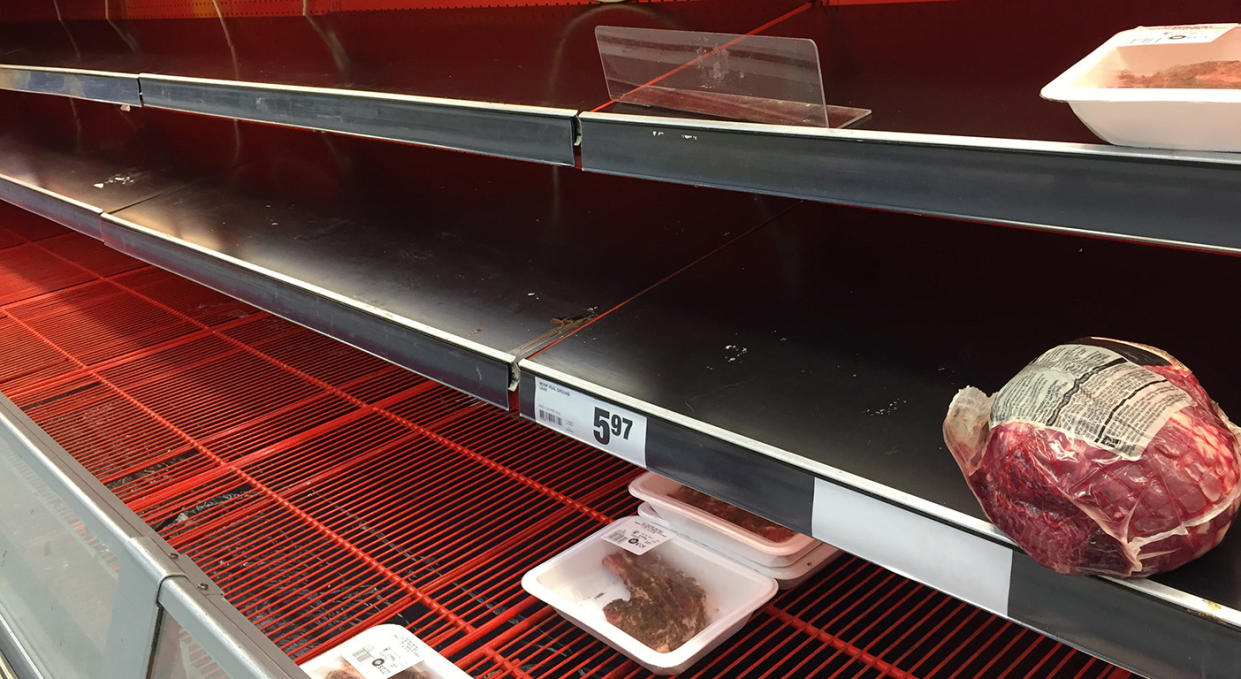'We do see it as a critical situation': How COVID-19 is impacting Canada's meat supply

COVID-19 continues to wreak havoc on Canadian businesses with beef producers being the latest victims of the pandemic, which could be starting to affect meat supply chains.
“They’re going to continue to see beef on their shelf, it’s just going to be a reduction in capacity,” said Fawn Jackson, director of government and international relations at the Canadians Cattlemen's Association (CCA).
The problem for beef producers originates in High River, Alta., where there’s been a reduction of staff at the Cargill processing facility after several dozens of employees at the plant tested positive for COVID-19.
The union representing employees who work at the plant had been trying for weeks to get Cargill shut down, but no action was taken at the time. The union said at least 38 workers have tested positive for coronavirus.
The Alberta-based facility is responsible for the production of over one-third of all beef in Canada. Similarly, other Canadian and U.S. beef processors have also been forced to reduce their packing capacity by cutting the amount of workers they can have on the floor at any given time.
“We do see it as a critical situation for our farmers and ranchers, which requires urgent action, but we won’t see large interruptions in the immediate future,” said Jackson.
In late March family-owned Harmony beef plant, just north of Calgary, shuttered their doors after announcing an employee had tested positive.
The CCA said all their facilities have adopted better hand-hygiene practices, conducting temperature checks, additional cleaning and disinfection and advising employees to self-monitor their symptoms.
They have also submitted recommendations to the federal government, which includes designating the entire food supply chain as critical infrastructure into the national strategy if COVID-19 carries on.
“We need to work with the government here, we need them to address the recommendations and help the future of cattle production,” she said.
They’re also asking the government to create feedlots for a set-aside program, which would stay in place during the course of the pandemic and provide financial relief for cattle producers and farmers similar to 2004 during the mad cow disease crisis.
“We learned many lessons during the hard years of BSE (bovine spongiform encephalopathy), and it is time to implement the policies that previously helped us weather the storm,” Bob Lowe, president of the CCA, said in a press release.
Setting aside cattle would allow ranchers to delay marketing of cattle until processing capacity was increased back to normal levels.
Affecting all meat producers
Beef processors are not the only ones feeling the pinch, as Olymel, a Quebec based pork processing plant, re-opened on Tuesday after being closed for two-weeks following an outbreak of the virus. The company has reduced the amount of meat processing they will do at one of their plants.
Down south a major U.S. pork plant, South Dakota’s Smithfield Foods, closed their facility this week after more than 100 employees contracted COVID-19. The company is one of the largest pork suppliers in the world.
In Ontario, Maple Leaf closed their Brampton poultry facility after three employees were infected. The company has yet to decide on how they will proceed or re-open.
Despite the closures, Jean-Michel Laurin, president and CEO of the Canadian Poultry and Egg Processors Council, said part of the reason for the contractions is that food processing plants are tough places to practice physical distancing.
Laurin notes his processing plants have installed plexiglass and employees are being provided personal protective equipment, but the lack of space continues to be a challenge.
“Some of our processing plants in certain areas, the government has acknowledged that we can’t follow the social distancing recommendations,” he said.
Despite limited space and other meat facilities feeling the effects of COVID-19, the same economic impact has not been felt by poultry farmers and processors who have been largely unscathed.
“We’ve seen the food sector frantically reduce activity, a lot of the products are being redirected directly to the retail sector because that’s where people are shopping,” he said. “We’ve been very busy with realigning our industry for the retail market.”
Meat at retail
Everyone has seen the images of Canadians at their local grocery store stocking up on pounds of meat, scared there may not be enough product come the next week.
However, after the initial buying frenzy ended, Laurin notes it seems people are changing their behaviour due to the financial situation.
“We’ve seen shifts in consumption, people originally stocking up and buying larger quantities of meat, and while the demand is still strong, it’s not as strong as before,” he said.
To continue to make sure there’s enough on the table for everyone, the CCA is recommending people only buy as much as they normally would.
“We encourage consumers to buy what they need, but not more than that during the pandemic,” said Jackson.
According to the Canadian Food Inspection Agency’s website, there are currently no shortages or disruptions to production, importation or export of any meat.



